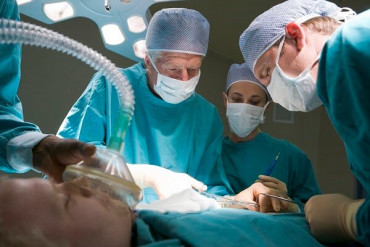Why Did My Husband Stop Breathing During Surgery?

If someone you love stopped breathing during surgery, the effects can be catastrophic. Even if the doctor does not make you aware of stopped breathing during a medical or surgical procedure, there are ways to determine if it has occurred. In some cases, the patient may have already died from the brain injury that occurs due to lack of oxygen to the brain. In other cases, the lack of oxygen results in anoxia or hypoxia. This could be caused by a doctor's error during the procedure.
Anesthesia Related Breathing Issues
During many surgeries, anesthesia is needed. It is possible to breath normally during general anesthesia. However, there are surgeries in which a ventilator is needed to continue the breathing process for the patient. Sometimes a breathing tube is needed and the patient will not always continue breathing on their own. There have been numerous cases in which ventilators have malfunctioned and doctors did not react quickly enough to mitigate the harm to a patient.
Anoxia
Anoxia is the medical term for an absence of oxygen. When anoxia occurs, there are several complications that have the potential to arise. Some of these complications include mental confusion, amnesia, hallucinations, memory loss, personality changes, and more. The patient may also be in a vegetative state or may suffer from cardiac arrest. There are many things that can happen to an individual who suffers from anoxia during surgery and they can all be avoided.
Hypoxia
Hypoxia is a bit different than anoxia as it is defined as a deficiency in the amount of oxygen that reaches the tissues. This occurs not only when breathing stops but also if the amount of oxygen is lower than it should be. This can occur if the oxygen tank is operating at low capacity and is therefore the result of a lack of planning on the part of the doctor. Hypoxia can cause brain damage or even damage to other organs. The longer this occurs, the more damage there will be. If this does occur to a patient, it can result in depression, heart failure, an increased heart rate, and even high blood pressure long after the surgery is completed.
If someone you know has died from one of these complications, or if they have suffered from them and are now out of imminent danger, it may be time to speak to one of the doctors on staff at our law firm. Considering a lawsuit to help pay for expenses that resulted from this mistake is a logical decision. Contact us today to get started.
Disclaimer: Ross Feller Casey, LLP provides legal advice only after an attorney-client relationship is formed. Our website is an introduction to the firm and does not create a relationship between our attorneys and clients. An attorney-client relationship is formed only after a written agreement is signed by the client and the firm. Because every case is unique, the description of awards and summary of cases successfully handled are not intended to imply or guarantee that same success in other cases. Ross Feller Casey, LLP represents catastrophically injured persons and their families in injury and wrongful death cases, providing legal representation in Pennsylvania and New Jersey.





